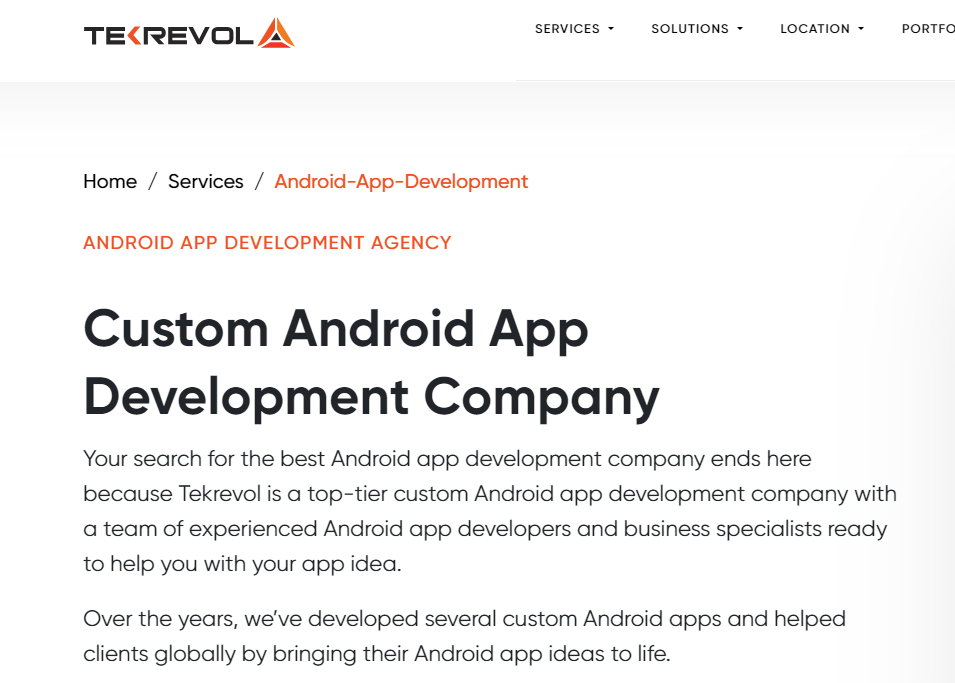In the ever-growing mobile app development industry, where innovation is paramount, the Agile approach has become the most prioritized choice as a development process. It’s a set of principles that are transforming the way apps are developed.
Agile methodologies have been steadily incorporated in the software development industry to build different types of projects. They overcome the limitations of traditional project management methods, which often resulted in delayed releases of the mobile apps. With the innovation of mobile technology and the demand for user-friendly and feature-rich apps is increasing. To facilitate the users in the best way possible, Agile has become a go-to strategy for every Chicago mobile app development company.
Agile becomes the first choice of developers due to its iterative and collaborative nature. It supports diverse teams to work closely with clients while maintaining an adaptable development process. The app development industry, recognizing these advantages, and there has been a significant shift towards Agile methodologies.
This blog will dive into the in-depth knowledge of the Agile approach and its influence on mobile app development. That’s how you can utilize an efficient way to create apps but while ensuring client satisfaction and product quality.
Understanding Agile Methodologies
Agile methodologies have become a reliable approach to develop mobile apps at a large scale. By using Agile principles, development teams can adapt and respond to change more effectively. Here are the foundational concepts of Agile methodologies on which this approach is based:
Core Agile Principles
Agile is a set of principles and practices that offers flexibility, collaboration, and customer-centricity in software development. It is a departure from the traditional waterfall model, which follows a sequential approach. Agile methodologies emphasize the following core principles:
Individual interaction over processes: Agile values human communication and collaboration. It acknowledges that effective teams and clear communication are more important than rigid processes or specialized tools.
Working software over documentation: While documentation is essential, Agile prioritizes delivering working software. This means that throughout the development process, the focus remains on producing tangible results that can be tested and refined.
Encourage Customer collaboration: Agile emphasizes a partnership between developers and customers. It encourages open communication, frequent feedback, and a willingness to adapt to changing customer needs.
Response change over current plan: Traditional development often involves sticking to a predetermined plan, even when circumstances change. Agile, on the other hand, welcomes change and treats it as an opportunity to improve the product.
These principles form the foundation of Agile methodologies, guiding teams to prioritize individuals, working software, collaboration, and adaptability. If you want to become the best CRM development company, this is the right approach to build your apps.
Benefits of Agile in Mobile App Development
Mobile app development is a dynamic and competitive field, and the Agile approach offers advantages that can make a significant difference in the success of your projects. Let’s explore the key benefits of adopting Agile methodologies in mobile app development:
- Enhanced Flexibility:Agile methodologies offer a high degree of flexibility. Mobile app development can be subject to rapidly changing market conditions, user preferences, and emerging technologies. Agile allows teams to respond to these changes by adjusting project priorities and features swiftly.
- Faster Time-to-Market:Agile’s iterative development approach, with its shorter development cycles known as sprints, enables quicker delivery of app features. This accelerated pace can help your app reach the market sooner, gaining a competitive edge and generating revenue faster.
- Improved Collaboration:Agile methodologies emphasize collaboration among development teams, clients, and stakeholders. Regular communication and close cooperation foster a shared vision for the app, resulting in better decision-making
- Higher Client Satisfaction:The client or end-user is at the core of Agile methodologies. Continuous client involvement and iterative development cycles mean that clients have more opportunities to provide feedback. This client-centric approach leads to higher satisfaction, as the final product aligns more closely with their vision and requirements.
- Adaptability to Change:Agile’s ability to accommodate change is impactful in mobile app development. It recognizes that market conditions, user preferences, or business needs may change. Also, it provides a framework for adapting to these shifts without disrupting the entire project.
- User-Centric Development:Agile places a strong emphasis on user feedback and user testing. By incorporating user input in the development process, the app becomes more user-friendly, resulting in higher adoption rates and user satisfaction. That’s why it
- Frequent Testing:Agile encourages frequent testing throughout the development procedure. This iterative approach helps identify and address issues early in the development cycle, reducing the risk of major setbacks or post-launch problems.
- Continuous Improvement:Agile teams regularly conduct retrospectives to reflect on their work and identify areas for improvement. This culture of continuous improvement ensures that the development process becomes more efficient and effective over time.
- Open and Transparent Communication:Agile methodologies emphasize open and transparent communication within the team and with stakeholders. Daily stand-up meetings and sprint reviews ensure that everyone is informed about the project’s progress and any obstacles being faced.
- Efficient Resource Allocation:Agile practices prioritize the development of high-value features. By focusing on the most valuable items first, development teams can allocate resources more efficiently, reducing waste and optimizing the use of time and talent.
Wrapping it Up
As a conclusion, we can have an understanding that Agile methodology is the most suitable approach for mobile development. Offering enhanced flexibility, quicker time-to-market, improved collaboration, and higher client satisfaction, it has become the first choice of almost every android app development company. By utilizing Agile’s adaptability, user-centered approach, and focus on continuous improvement, development teams can deliver exceptional products that meet user expectations.










